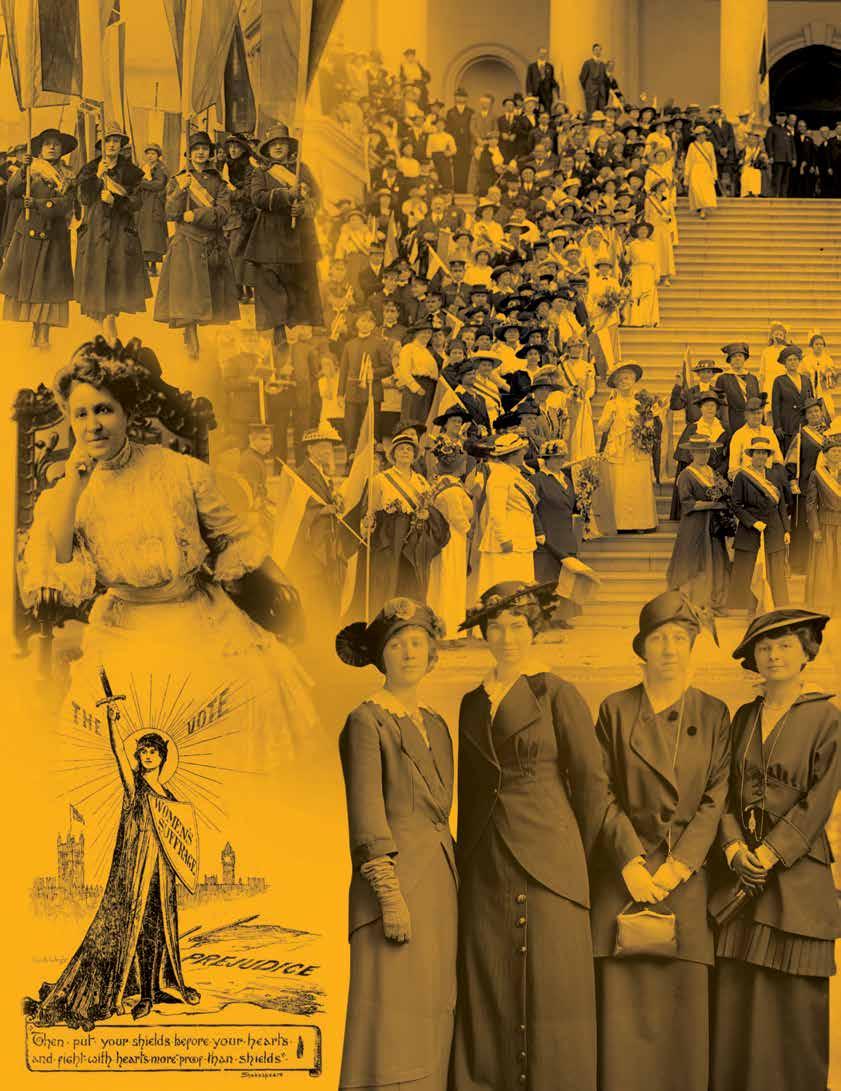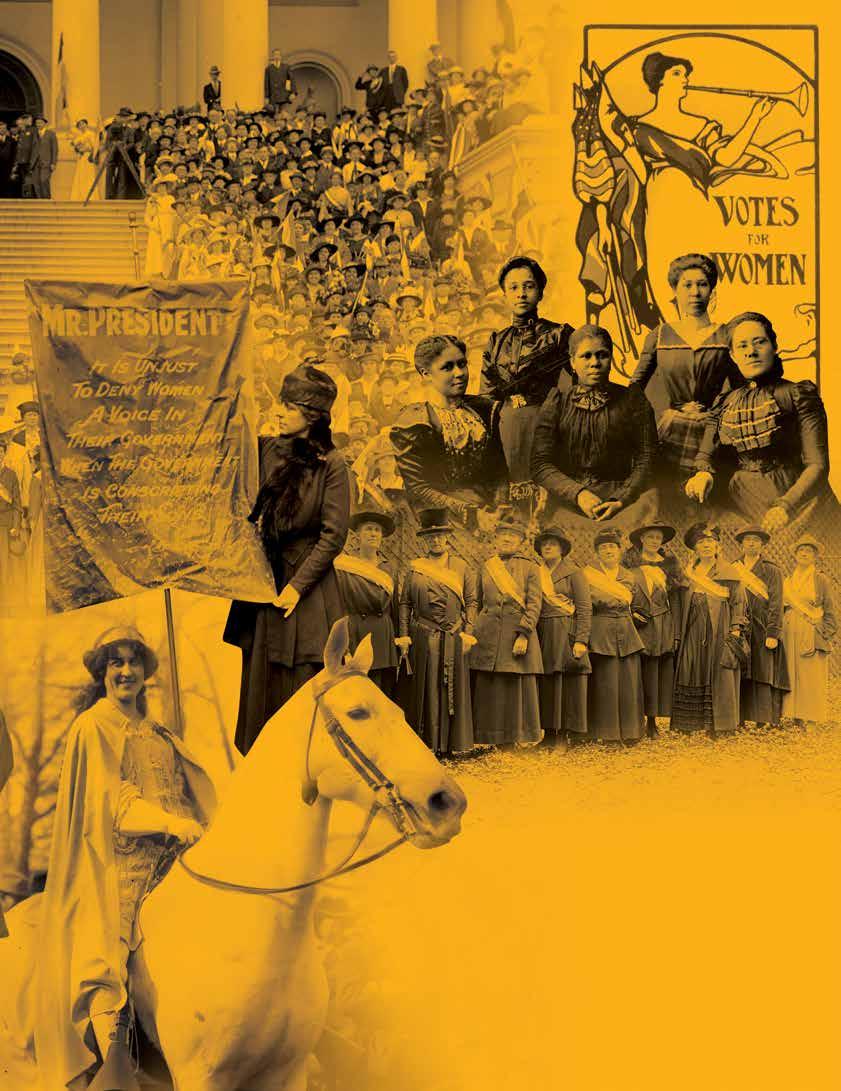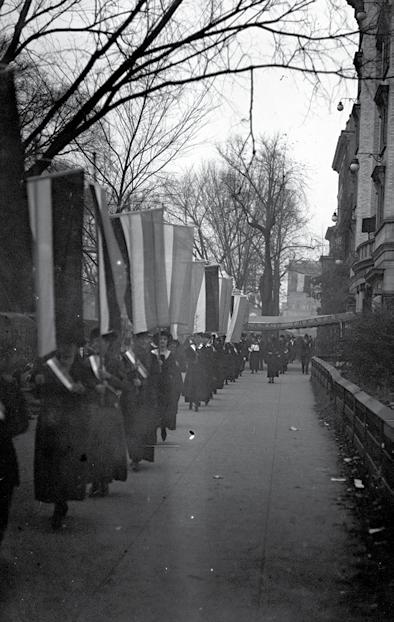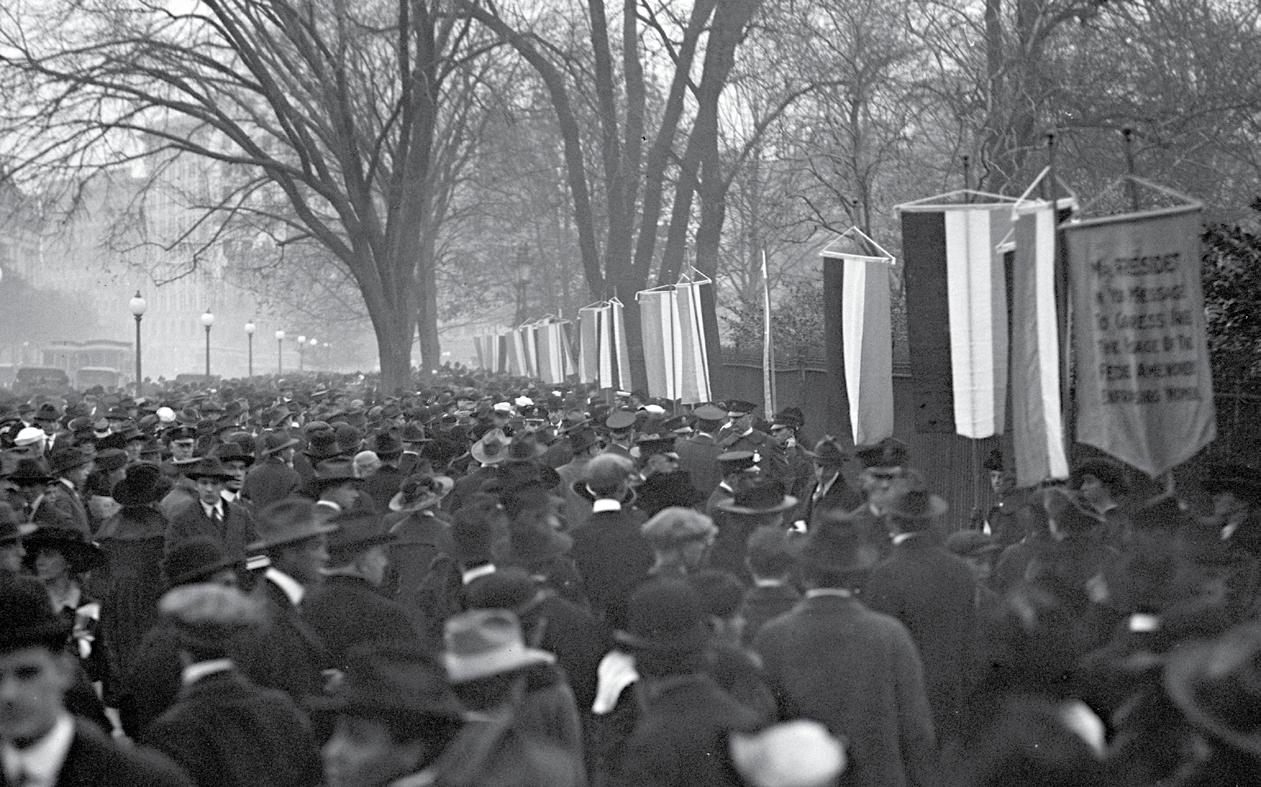
10 minute read
Year of the Woman
3PART

What’s Up? Media has teamed up with many passionate women from the community to commemorate the centennial of women’s suffrage. Year of the Woman is a nonprofit organization devoted to celebrating how far we’ve come while envisioning what’s next. Through this endeavor, we hope to create a platform in which the community as a whole can join the conversation, discussing the changes that have taken place while envisioning the next 100 years and the work yet to be done. In this upcoming year, the What’s Up? Media publications will feature a series of stories themed around women’s suffrage. Throughout 2020, Year of the Woman hopes to sponsor a series of speakers, events, films, and book clubs. We also plan to work closely with local schools so that children and young adults—who can’t even imagine a world where women had no rights—can learn the importance of this monumental time in history. We hope that you can join us in bringing awareness to the 100th anniversary of women receiving the right to vote!

-Harriet Tubman photographed later in her life, 1911
Lighting the Torch of Universal Suffrage
Black suffragists blazed the trail for
black men and white women to secure
voting rights in the United States,
all while being rejected by both groups
By Maya Davis
Sojourner Truth, circa 1870. Photograph courtesy National Portrait Gallery, Smithsonian Institution.
When it comes to women’s history and, especially, the suffrage movement, certain names will always stand out, such as Susan B. Anthony and Elizabeth Cady Stanton. They have been highlighted many times in the annals of history. However, there are many more names, which the history books often neglect to shed light upon or give a voice. They are the lesser-known or forgotten figures of the movement. This is especially true for trailblazing African American women, including Sojourner Truth, Ida B. Wells, Mary Church Terrell, and Lillie Carroll Jackson. These women stood at the intersection of being black and being female in a society that didn’t respect either classification. In Maryland, two women, Francis Ellen Watkins Harper and Harriet Tubman, also gave their voice for the cause of woman suffrage.
Frances Ellen Watkins Harper and Harriet Tubman were from the same state but came from different backgrounds. Harper, an accomplished poet, abolitionist, and suffragist was born of free parentage in 1825, in Baltimore, Maryland. Although she was born free, Harper was subjected to many of the oppressive conditions inflicted upon enslaved and free blacks living under Maryland’s strict slave laws.
Her mother died when she was a young girl, leaving Harper to be raised by her uncle Rev. William Watkins. Harper was greatly influenced by her uncle who was a supporter of anti-slavery efforts and who spoke out against colonization. She, herself, would go on to become an outspoken orator, speaking out against slavery after witnessing it in the border state in which she was born. In 1856, Harper visited escaped slaves who settled in Canada. That experience was documented in a letter she wrote from Niagara Falls which stated, “Well I have gazed for the first time upon Free Land, and, would you believe it, tears sprang to my eyes, and I wept. Oh, it was a glorious sight to gaze for the first time on a land where a poor slave flying from our glorious land of liberty would in a moment find his fetters broken, his shackles loosed, and whatever he was in the land of Washington, beneath the shadow of Bunker Hill Monument or even Plymouth Rock, here he becomes a man and a brother.”
In 1860, she married Fenton Harper, causing Harper to slow down on her speaking engagements. The Harpers quickly grew their family when they gave birth to a daughter, Mary. Sadly, the Harper union was short lived when Fenton Harper died in 1863 leaving his wife a widow and single mother. His death put Frances Ellen Watkins Harper back on the pulse of issues facing her people. Now, Harper was the only breadwinner in her home and needed to secure funds to provide for herself and her daughter.
Harper’s life and career spanned the course of abolition and women’s rights in the 19th century, essentially charting the course for her work to champion both causes. As a poet, she gave voice to the plight of enslaved communities and women. Like Frederick Douglass, Harper made a living as an orator, speaking at abolitionist events. As Harper traveled widely throughout the North and the South, she gained a fuller understanding of the issues affecting African Americans and women. She lived in Ohio before settling in Philadelphia in 1870. This new understanding shifted her oratorical lectures to focus on women’s rights including suffrage. Her treatment in Ohio caused her to reflect on her condition as a woman and a widow, and she shared that experience at the 11th Annual
Frances Ellen Watkins Harper, born in Baltimore in 1825, fought for women’s rights until her death in 1911.
Aunt Chloe’s Politics
Of course, I don’t know very much
About these politics,
But I think that some who run ’em
Do mighty ugly tricks.
I’ve seen ’em honey-fugle round,
And talk so awful sweet,
That you’d think them full of kindness,
As an egg is full of meat.
Now I don’t believe in looking
Honest people in the face,
And saying when you’re doing wrong,
That “I haven’t sold my race.”
When we want to school our children,
If the money isn’t there,
Whether black or white have took it,
The loss we all must share.
And this buying up each other
Is something worse than mean,
Though I thinks a heap of voting,
I go for voting clean.
Woman’s Rights Convention in 1866. “Had I died instead of my husband, how different might have been the result. By this time, he would have another wife, it is likely; and no administrator would have gone into his house, broken up his home, sold his bed, and taken away his means of support. I say then that justice is not fulfilled so long as a woman is unequal before the law.”
Harper, equipped with her new position on women’s rights joined various suffrage organizations. She was a member of the American Woman’s Suffrage Association. During this time, she also returned to writing poetry, some of which shared her views on politics and voting from a woman’s perspective:
In 1869, when Susan B. Anthony and Elizabeth Cady Stanton left the American Equal Rights Association because it was supporting the 15th Amendment, Harper refused to follow realizing that the two women were prioritizing the privilege of their race over that of black men.
She noted that she could not rely on white women to prioritize the concerns of their nonwhite sisters. Frederick Douglass would also part ways with the two women, instead placing his focus on the cause of Negro suffrage. Harper fought for women’s rights until her death in Philadelphia on February 22, 1911.
A contemporary of Harper, Harriet Tubman is internationally known for her courageous life, liberating herself and numerous others held in bondage. However, often overlooked is the life she lived after the emancipation of slavery in the United States. While Tubman was a valorous abolitionist, she went on to become a leading champion for women’s suffrage.
Endorsing the Cause
When the 15th Amendment was adopted into the U.S. Constitution in 1870 granting African-American men the right to vote, all women were excluded. While it seemed like an easy win for African American men, many tactics were put into place to prevent them from voting. Some states instituted poll taxes and literacy tests to hinder them from the polls. As a result of this exclusion, a divide was created between white women and African Americans. Various groups were formed to help push the agenda of women’s suffrage. However, race kept black women at the sidelines of the larger Women’s Suffrage Movement.
Southern politicians and racist women spoke out against securing the vote for black women. African American women’s exclusion from whiteled suffrage groups did not deter them from organizing their own separate groups. Through the formation of their own organizations, African American women could work on social issues that affected them. Among the first groups was the National Association of Colored Women (NACW), which was founded in 1896 in Washington, D.C. The motto of the NACW was “Lifting as we climb.”
1913, the Alpha Suffrage Club of Chicago was founded by Ida B. Wells, as the nation’s first Black women’s club focused specifically on
Born enslaved in Dorchester County under the name Araminta Ross, Tubman was greatly influenced by the women in her life. Her grandmother, Modesty, was an African. Tubman’s own mother, “Rit” Green, inspired her to become self-determined. Often described as uneducated because she was not able to read or write, Tubman shone bright as a communicator with years of experiential knowledge.

In 1860, Tubman made her first speaking appearance at a suffrage meeting in Boston. She was a close friend of suffragist Lucretia Mott and was a member of Anthony and Stanton’s National Woman Suffrage Association (NWSA).
During an interview in 1911, Tubman was asked “Do you really believe that women should vote?”
Before responding she paused due to her surprise at the question. Her response was simply “I suffered enough to believe it.” That phrase alone summed up the feelings of hundreds of black suffragists.
suffrage. Wells co-founded the Alpha Suffrage Club with white suffragist Belle Squire. One of the first activities the newly formed Alpha Suffrage Club participated in was the 1913 Women’s Suffrage Procession organized by suffrage leader Alice Paul in Washington, D.C., in support of a suffrage amendment to the Constitution. This event, like other suffragist affairs, was hindered by racist sentiments from southern white women who objected to African American women marching with them. As a result, organizer Alice Paul suggested that marchers be grouped, with African American women marching at the end of the parade. Fortunately, a later decision was made to have all women march with their home states meaning that African American women would not be segregated, nor marching at the end of the processional.
In November 2019, the Maryland Women’s Hall of Fame recognized African American suffragist Augusta T. Chissell, who worked tirelessly towards universal suffrage but without great recognition. Although, not as well known in the African American canon as Mary Church Terrell and Ida B. Wells, Chissell had a huge impact on the cause for women’s suffrage. Chissell, who was deeply embedded in Baltimore’s women’s clubs, used her social platform to push the voting agenda. Chissell was an active member

of the DuBois Circle, a women’s club established in Baltimore. The group grew out of W.E.B. Du Bois’ Niagara Movement, which was established in 1905 and was a precursor to the NAACP. Like other black women of the time, Chissell and the DuBois Circle organized and hosted political meetings at their homes and churches in Baltimore. In addition to the DuBois Circle, Chissell was an officer in Baltimore’s Progressive Women’s Suffrage Club.
On August 26, 1920, the 19th Amendment was enacted stating that “The right of citizens of the United States to vote shall not be denied or abridged by the United States or by any State on account of sex.” After the 19th Amendment was ratified in 1920, black women still had to fight for basic voting rights.
Although black women were largely excluded from white suffrage organizations, they continued to champion universal suffrage for all. Their organizations did not play into segregationist ideology but instead focused on “lifting as they climbed!”
Tune in each month as we continue our “Year
of the Woman” article series, and in the mean
Portrait of Ida B. Wells (1862–1931), an African-American journalist and civil and women’s rights activist.










